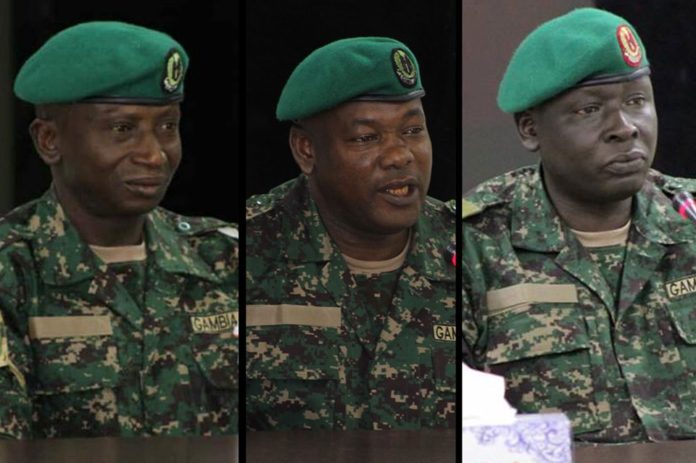
Relatives of people murdered by death squads in The Gambia expressed outrage on Monday over the release of three former hitmen, who said they committed dozens of assassinations ordered by ex-president Yahya Jammeh.
The men, who were part of an unofficial paramilitary unit known as the Junglers, were freed from army custody two weeks after appearing before the West African country’s Truth, Reconciliation and Reparations Commission (TRRC).
During the hearings, the assassins accused Jammeh — who ruled the country for 22 years — of ordering multiple murders, including the 2013 killings of two US-Gambians and Deyda Hydara, co-founder of The Point newspaper and AFP’s correspondent in The Gambia for 30 years.
“It’s wrong to hear all these confessions, then release the killers out in our streets, out in our communities, out in our societies,” his son, Baba Hydara, told AFP.
In a statement, Gambian Justice Minister Abubacarr Tambadou said his decision to release the three men — Malick Jatta, Omar Jallow and Amadou Badjie — was to encourage other alleged human rights violaters to testify.
“What we must not do is to scare people away from telling the truth because that will not be in anyone’s interest,” he said.
“Every victim family deserves to know the truth about their loved ones.”
The TRRC hearings, modelled on South Africa’s post-apartheid Truth and Reconciliation Commission, started in January and are expected to take two years.
At the end, the body can make recommendations with regard to prosecution or reparation but cannot itself issue any sentences.
Human Rights Watch on Monday warned that the hitmen, who were arrested in 2017 but have never been tried, could leave the country.
“If these hitmen flee The Gambia now, not only will they escape justice, but we will lose the key witnesses in any future trial against Yahya Jammeh for ordering these gruesome crimes,” said US attorney Reed Brody from HRW.
Hit squad
Jammeh ruled The Gambia — a tiny state that is almost entirely surrounded by Senegal, except for a small strip of coastline — after taking power in a bloodless coup in July 1994.
He was repeatedly re-elected in disputed circumstances until he was defeated in December 2016 by a relative unknown, Adama Barrow.
After a six-week crisis that led to military intervention by other West African states, Jammeh bolted from the country.
Human rights activists have accused his regime of the systematic torture of opponents and journalists, executions without trial, arbitrary detentions, forced disappearances and rape.
The commission has gripped the public with its graphic evidence.
Last month Badjie, a hit squad member, told the panel that Jammeh ordered in June 2013 for two US-Gambian businessmen who he suspected of planning a coup, Alhaji Ceesay and Ebrima Jobe, to be “chopped into pieces”.
The two men were arrested and suffocated, beheaded and buried, Badjie told the commission.
“Our team was a hit squad for Yahya Jammeh. We had blind loyalty for Yahya Jammeh,” he said.
Alhaji’s mother Ya Mamie Cessay expressed her horror at the release of the men.
“I feel so disrespected as a mother that my government is setting free the men who just confessed in the savage killing of my son,” she told AFP on Monday.
“What is the point of truth if the perpetrators of these crimes are set loose?”
The government has said the hitmen’s release is not an amnesty but has also not set out any restrictions to prevent them from fleeing the country.
Former soldiers, currently in custody, have also accused Jammeh of the murder of around 50 migrants rounded up on a beach as they were trying to make their way to Europe, but were taken for rebels.
Barrow has indicated he will wait for the commission to conclude before deciding on whether to request the extradition of Jammeh.
(AFP)










Recent Comments